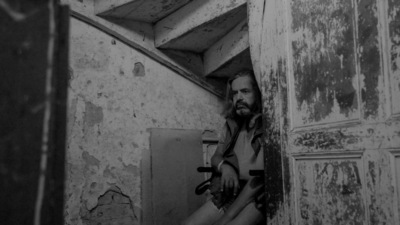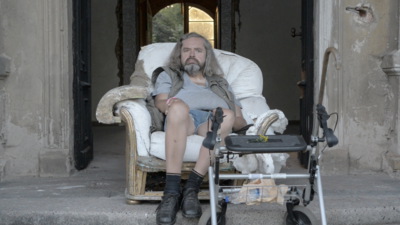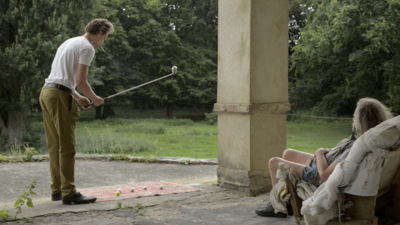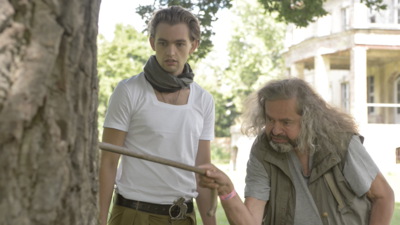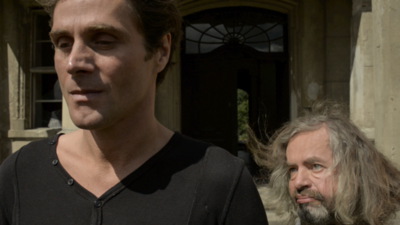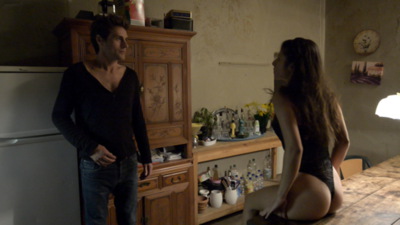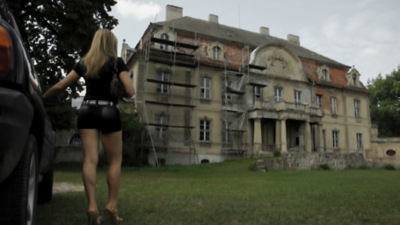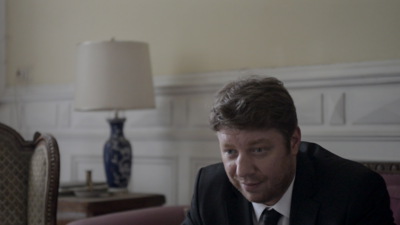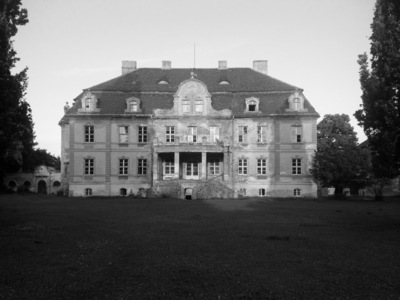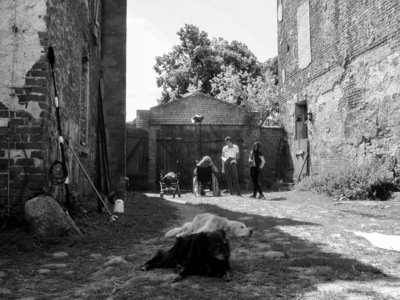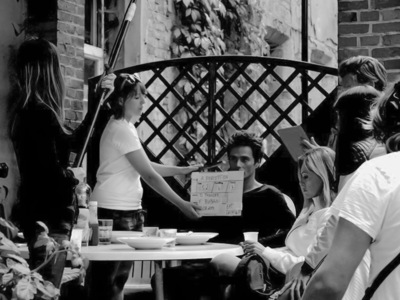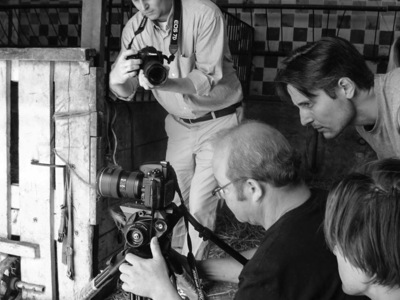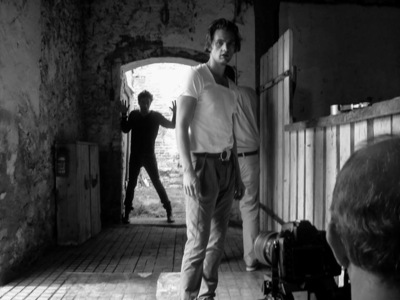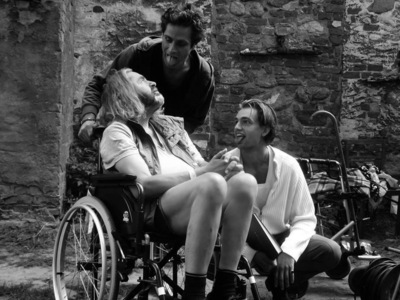A Perception
Description
- Art house movie, 82 minutes, Germany 2015
- written and directed by Daniel Pfander - head of production
Cast
- Count Hermes Phettberg
- Count‘s son Rainer Meifert
- girlfriend of Count‘s son Hanni Bergesch
- daughter of girlfriend of the Count‘s son Paulina Weiner
- Count‘s young employee Henning Gronkowski
- hitman Frank Künster
Plot
A debt-ridden, depressed, physically handicapped estate owner (Hermes Phettberg) is wasting away on his utterly run-down family estate. The only person who has stayed with him is the social worker Jean-Jacques (Henning Gronkowski), who lovingly cares for the lecherous wreck.
The estate owner has only one wish left - he wants desperately to see his only child die so that his bloodline will be cut off. He asks Jean-Jacques to murder his son in exchange for being named as the only heir in his testament. The chosen one doesn’t take it seriously, but the old estate owner doesn’t let up and pulls out all the stops to kindle the murderous rage in the young man.
Konstantin (Rainer Meifert), the estate owner’s severely cocaine-addicted son, is a deadbeat who has traveled the world aimlessly for 20 years. One weekend, with his live-in lover Nadja (Hanni Bergesch), an elderly prostitute, and her pubescent daughter Grace (Paulina Weiner), he comes back to the seat of the family for a visit. However, the son has heavy baggage with him. He has stolen drugs from a dangerous biker gang and wants to sell them in Poland.
Pictures
premiere
Vienna, Berlin, 2015 Viennale Film Festival
press
public perception
crowdfunding
advertising campaign for sponsorship
review
An immortal perception review of the film "A Perception"
At first, the plot of the drama is straightforward: an old estate owner with limited mobility (Hermes Phettberg) resides in the wasteland of his near-derelict estate in Pomerania. The man is so disappointed in his drug dealing son (Rainer Meifert) that he convinces his caretaker Jean-Jaques (Henning Gronkowski) to eliminate him so that, instead of forming a new bloodline, Jean-Jaques may become the son he always wanted. However, there is one limitation: the universally visible decay of the treasures of Hohenholz may not be altered under any circumstances, tristesse oblige. As fate would have it, the son appears in the humid Pomeranian heat in August with his lover, a prostitute (Hanni Bergesch) and their blossoming daughter (Paulina Weiner). Passions ignite, old and new conflicts arise, and so it arrives at the unavoidable final act of the drama.
What Daniel Pfander accomplishes with the limited resources of his zero-budget film is astonishingly remarkable. He has an artful understanding of how to fuse the scenery of the half-decaying manor with his lead actor Hermes Phettberg such that the illusion of run-down man and place appear in a perfectly harmonious synthesis. In so doing, the film takes us gingerly at first into the bizarre world of the cranky elder and his caretaker; a chaste love affair between patient and caregiver that contains sensual moments and connotes poetic inspiration. For instance, as the elder stands under the shower and is patiently washed by his caretaker, or when he watches the young man longingly as he bathes. In spite of this “Death in Venice”-tinted scene (which by all means could do with Gronkowski’s naked backside), the film develops its own identity without drifting into sentimental kitschiness, as is the case with most gay films. It would nevertheless be an error to confine this film to this genre alone, as it is predominantly about the depiction of interpersonal relationships, with all of their highs and lows, before the backdrop of ultimate financial ruin. That it enables Hermes Phettberg, due to the size of his spirit, to win the audience over to his side, in spite of his efforts to obliterate his own bloodline, and portray the figure of the count as a personable, warm-hearted head of the family is one of the exceptional strengths of this movie. Although scarred by numerous strokes, his powerfully eloquent linguistic genius alone impresses through the inverse expressiveness of his deep stare and is capable of captivating the viewer from the start. No less admirable is the performance of the other actors – who admittedly do not always have it easy to exist alongside the titan Phettberg – and to advance the plot skillfully to a place where longer dialogues from Phettberg would overwhelm the dialog space. Rainer Meifert convinces in the role of the washed-up son and sonny-boy, but even from his first appearance – and this is another specialty of the film – he earns the sympathy of the audience. This allows Pfander to maintain a suspense that leaves the ultimate outcome of the plot open in that he cleverly plays two sympathetic figures against each other. As a failed existence, Meifert manages to keeps his head above water, whereas an impeccable Hanni Bergesch, in the role of the prostitute Nadja, depicts the last support on his side. A couple meant to be together, to drift through life and strand themselves happily somewhere – or perish. The younger generation stands in contrast (especially mischievous: Henning Gronkowski) in the figures of the dreamy caretaker Jean-Jaques and the sensually erotic Paulina Weiner as Nadja’s younger daughter. Succumbing to the mutual attraction of their bodies, it may nevertheless be questioned, whether the youth will really do better than the previous generation. In this manner, the drama in the Hohenholz manor grows into a conflict over three generations.
Daniel Pfander masters his craft as a filmmaker, although the minimal budget of the film only allows for night shots in modest quality. This alone does not detract from the entertainment value; the viewers are still rewarded with great images. The absolute highlight of this quite tragicomic film is the tea scene, when the old man of Hohenholz receives his son and the entire entourage at tea in the drawing room of the castle. One can say with absolute certainty that Pfander has managed – at least for a short moment – to reignite Phettberg’s old fire and to overcome the effects of his disease. That alone earns him the distinction of immortality.
translated by BRIAN LEMKE

